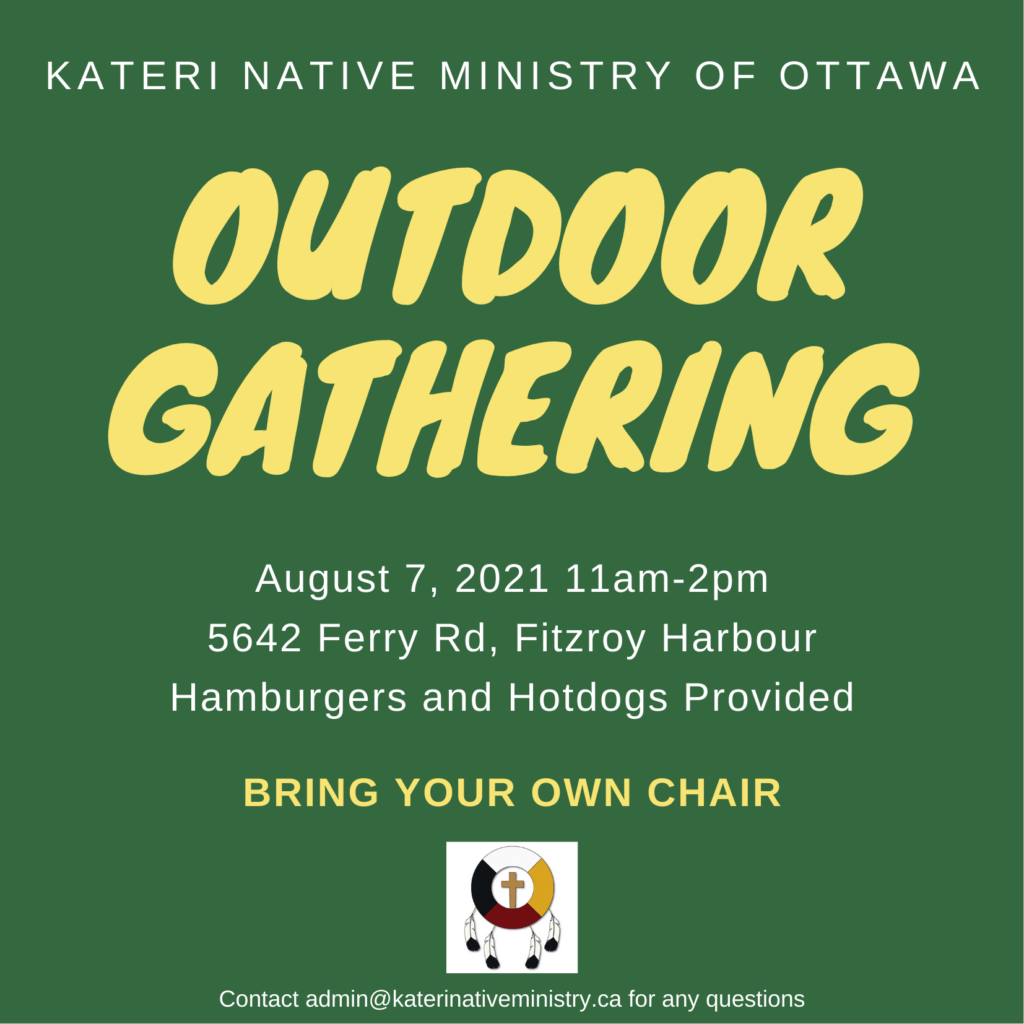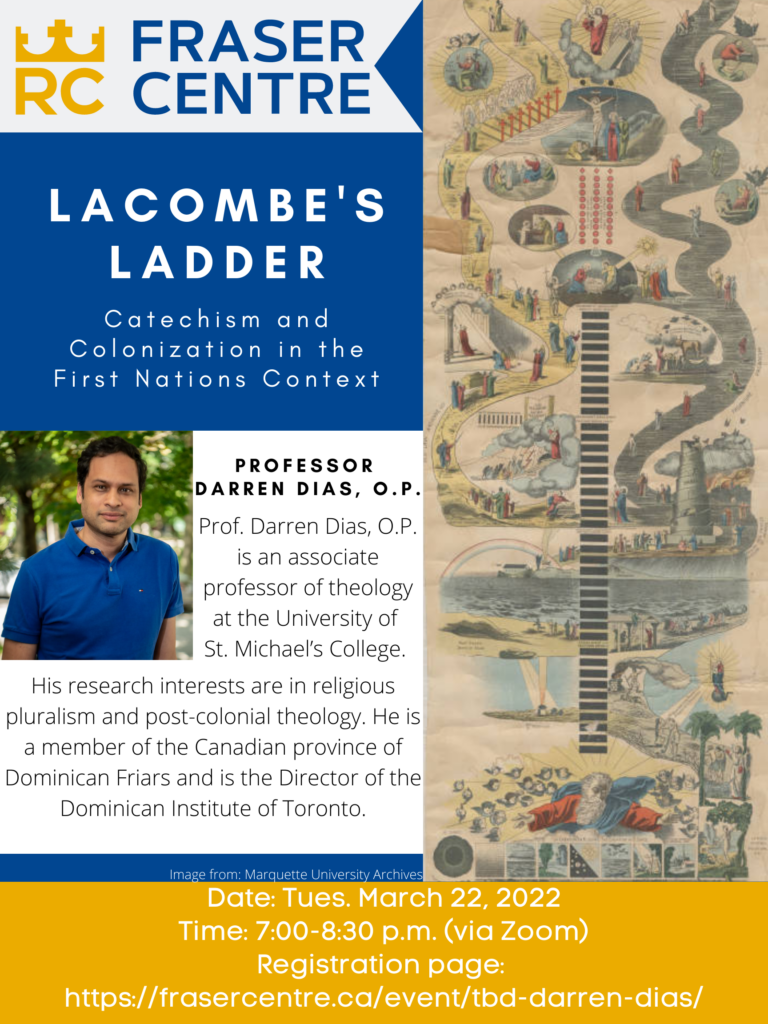


Kateri Native Ministry of Ottawa will at the Sacred Fire and Prayer Vigil, in support of the First Nations, Métis, and Inuit Delegates meeting with the Pope in Rome During the week of March 28. For more information, please visit the Galilee Centre Website.
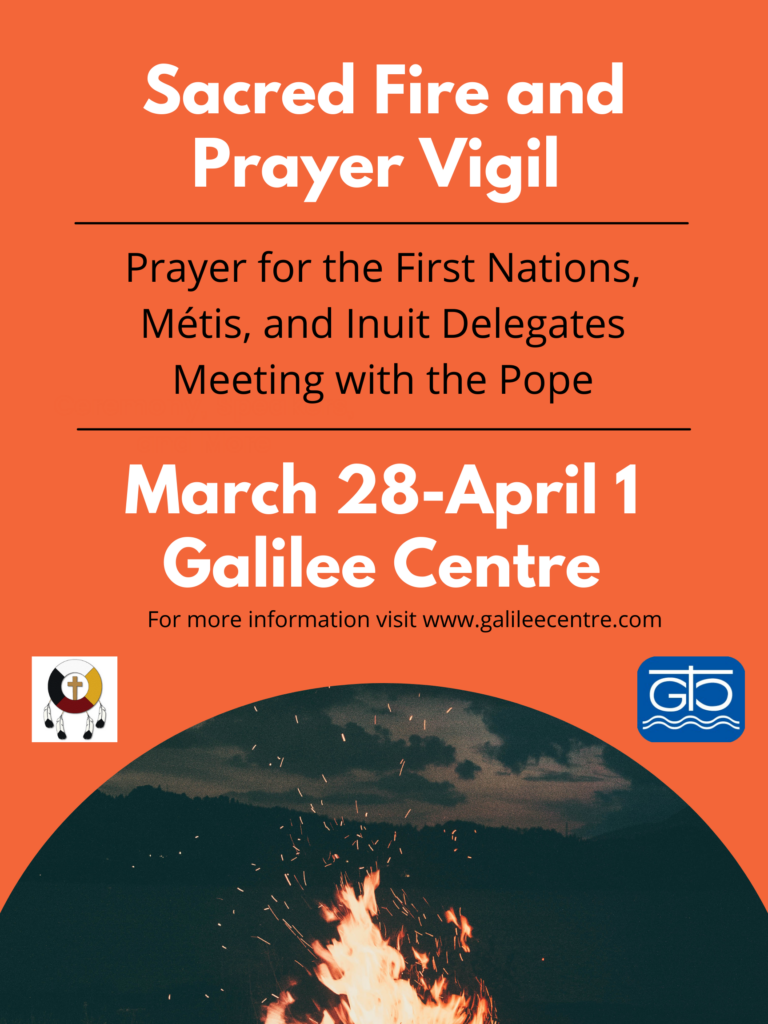
Our Holy Father invited catholics to express their dreams, ideas and concerns in preparation for the Synod of Bishops scheduled for 2023. The sharing circles on synodality is to discern a path forward for the church. Our synodal gathering will ask two questions: 1) How do you experience church today and 2) What are your dreams and hopes for the future. These will be the 2 questions we engage in listening. There will also be a time of reflection.
The synodal process began at the Vatican on October 9-10 and was launched in October 16-17th in dioceses worldwide.
The synodal process is simply listening and hearing one another and how to engage with one another. All dioceses are asked to send in a report. Kateri will submit its own report.
Please plan on attending our Synodal sharing circle at St. Basil’s parish located at 940 Rex Avenue, Ottawa on April 2, 2022 from 9am to 12 noon. For those who cannot attend in person, there will be an option to attend via Zoom.
There will be coffee and light refreshments.
Carol David and Donna Naughton will guide you through the process.
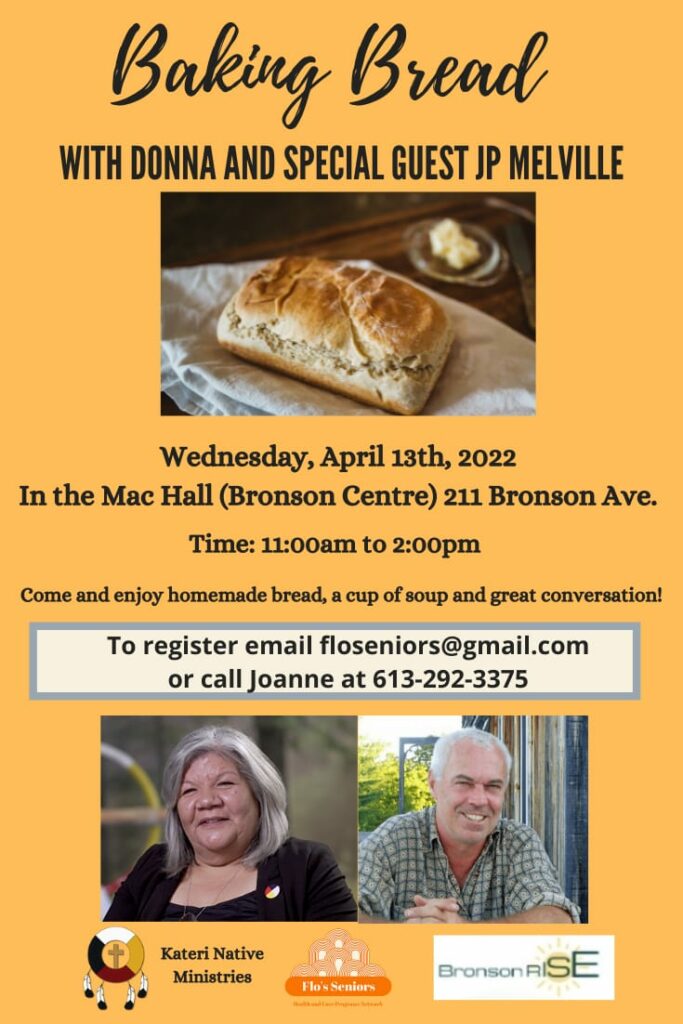
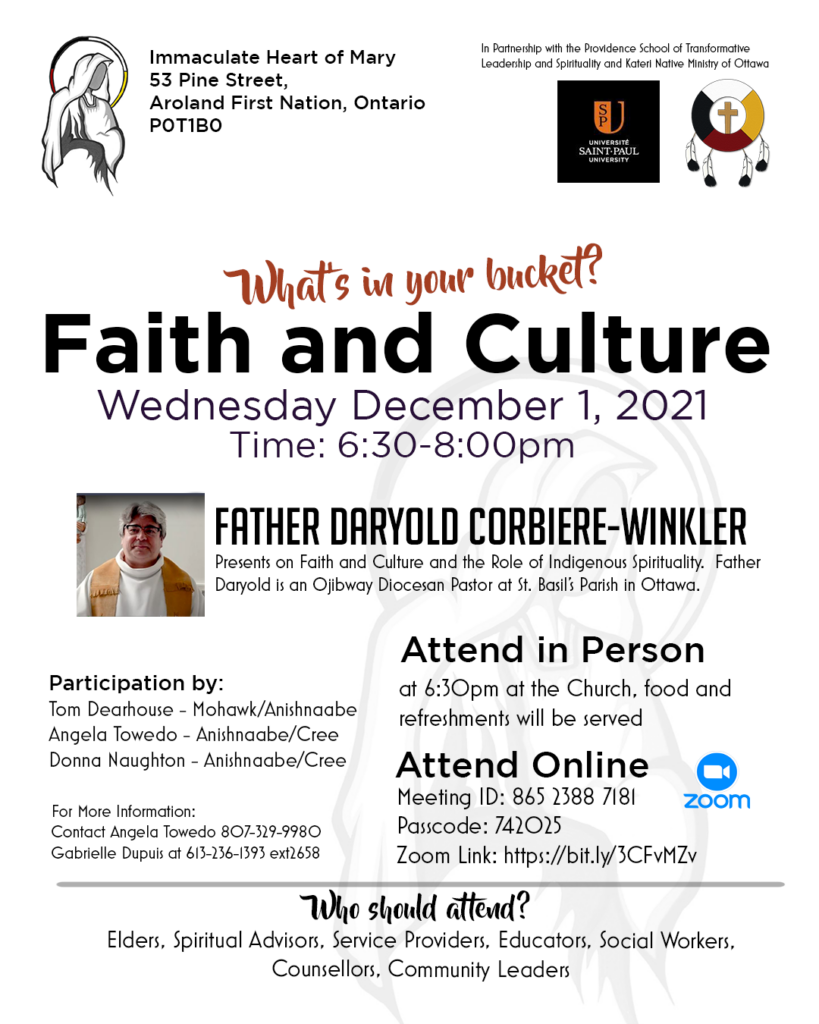
The Canadian Council of Catholic Bishops have issued an apology to Indigenous people for the Residential School System.
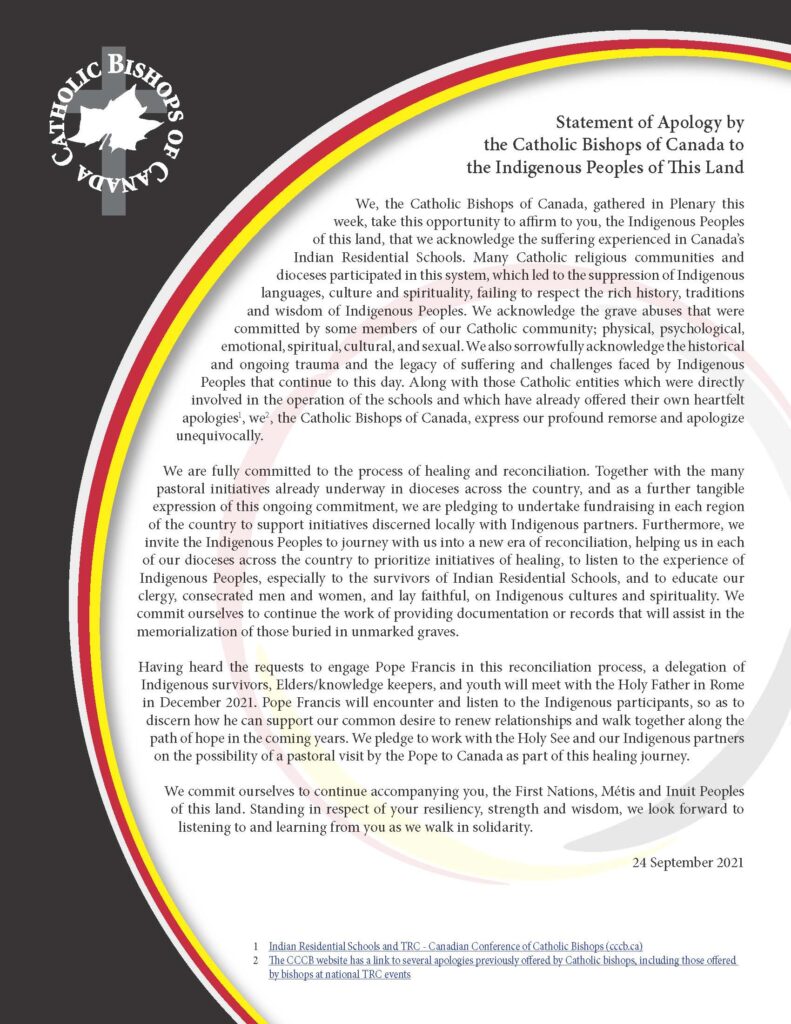
“Say something. Do something…” these words were spoken by Abigail (not
her real name), a survivor of the residential school system. Simple words that express
so much pain and hope.
“Say something. Do something… because…
“I ran away from the residential school when I was 14. I travelled 2 weeks on the road
in the middle of winter, begging food and shelter on the way. When I got home, I was
afraid my mother would send me back. She looked at me and said:” I love you; you’re
not going back.”
“I was nine years old and forced to pray on my knees all night next to my bed for
something I had done wrong, I don’t even remember what it was. All I remember was
waking up in the morning with my head on my mattress.”
“One day two of my friends ran away… we never saw them again”
“On the second floor of the Spanish Residential School were Visitors Rooms. There
were two. One for the elite visitors like the government and church officials, and another
room for our parents and family. Even in the school our lives were segregated.”
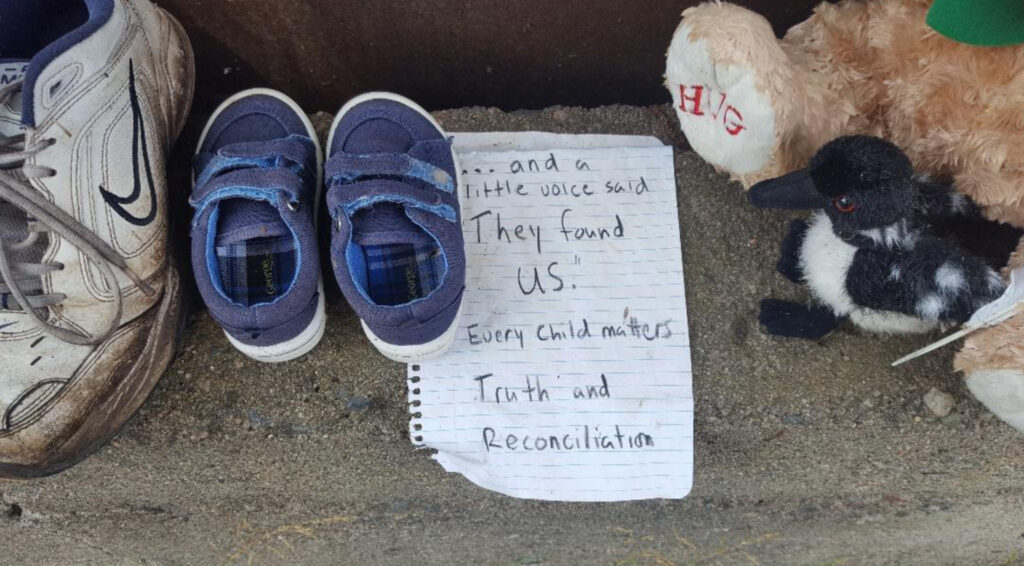
“Three times a year (Christmas, Easter and Summer) we were sent home to see our families. Some had no family to visit and stayed in the school. I remember walking to the bus taking us away and, seeing a small hand under an open window sash, slowly waving goodbye. I cried.”
“On our Reserve we still can’t drink the water without boiling it first.”
“Every family on our Reserve has experienced the tragedy of suicide and addiction”
Say something. Do something… What have we said or done to reconcile with our Indigenous brothers and sisters?
In July, I (Michel David, International Counsellor and JPIC Team Leader, OFS Canada) participated in a three-day Spiritual Retreat at
the Anishinaabe Spiritual Centre in Espanola, Ontario (Spanish is a town in the province of Ontario, located on Trans-Canada Highway 17 in
the Algoma District near the border of the Sudbury District). The retreat had been organized by Kateri Native Ministry (Ottawa). Approximately 20 of us met around a Sacred Fire. We came in solidarity from as far as Akwesasne in Québec, Hamilton in Southern Ontario, and the upper Great Lake lands. We came to listen, share, pray, and remember the children who died at the Spanish Residential School less than an hour away.
Cultural genocide is a difficult talking point, but this is exactly what happened according to the Canadian Historical Association: “The Canadian Historical Association, which represents 650 professional historians from across the country, including the main experts on the long history of violence and dispossession Indigenous peoples experienced in what is today Canada, recognizes that this history fully warrants our use of the word genocide……”
Say something. Do something … Listen
I participated in the Talking Circle, also called a Peacemaking
Circle and a traditional North American Indigenous practice
“based upon equality between participants and the principle of
sharing power with each other instead of having power over
one another.”
In the Circle, with a Sacred Fire burning, we welcomed the
sunrise and welcomed the new day. We shared, we listened,
we cried. At sunset we thanked the Creator for the many
blessings of our day. We contemplated what we had learned
and what steps we could take to put our reconciling heart into action.
Let’s be honest with ourselves, everyone seems to have an opinion about what the
Church should do, or the politicians, or Indigenous Peoples… but very few of us look
inward and take responsibility to act with justice, peace and integrity.
Say Something. Do Something…. but what?
For many of us, we avoid taking personal responsibility and action by doing the least
possible such as passing on Memes and PDFs on the Internet, or giving a donation to a
group supporting clean water, or some other basic need… and then we figuratively wipe
our hands clean (like Pilate) and think, I have done what I can do, the rest is up to
someone else. Is it really?
Every time more graves are discovered our hearts ache. Is our sum total of action to be
a pointless blaming of the Church, and the Provincial and Federal Governments?
The message of Jesus was simple: “Love one another as I loved you” So, what do we
need to do to love one another and reconcile? What does reconciliation even mean?
Merriam-Webster describes it as an “act of causing two people or groups to become
friendly again after an argument or disagreement or, the process of finding a way to
make two different ideas, facts, etc., exist or be true at the same time.
There is a great weight on our shoulders for the wrongs committed by our Church and
Governments. We cannot brush this away with an apology and a bag of money. We
need to educate ourselves and our society about what really happened and change the
dialogue from: This is your story… to: This is our story. Finding out what happened and
what went wrong is only half the solution, the other half is deciding what will be done
about it?
Say something. Do something……. How?
There are many places you can turn to for help. As Franciscans, we should take
seriously the mandate of Rule 15 “Let them individually and collectively be in the
forefront in promoting justice by the testimony of their human lives and their courageous
initiatives. Especially in the field of public life, they should make definite choices in
harmony with their faith.”
At first, I felt like an outsider looking in, but when the retreat ended, I understood that I
too belong, I too am part of the Circle and I too have a role to play in reconciliation. I
need to raise both my own and others’ awareness about colonization and its ongoing
effects on Indigenous Peoples. If we are not part of the solution, we are part of the
problem.
Listen:
Circles for Reconciliation The aim of Circles for Reconciliation is to establish
trusting, meaningful relationships between
Indigenous and non-Indigenous peoples
as part of the 94 Calls to Action from the
Truth and Reconciliation Commission.
La réconciliation est un cercle à la fois 10
rencontres, 10 personnes, une occasion de
mieux se comprendre entre Autochtones et
non-Autochtones.
Reconciliation Canada Do you have a back
pocket reconciliation action plan?
Act:
Catholics for Truth and Reconciliation This website is an “invitation for Catholics to
ignite or deepen our commitment to Truth and Reconciliation alongside Indigenous
peoples through donations and action pledges.” Check out their suggested action
webpage and post your own commitment to Reconciliation. (English and French content
available).
Stratégie de réconciliation avec les peuples autochtones 2020-2025
Montréal « franchit un important jalon dans la
réconciliation avec les peuples autochtones en
adoptant une Stratégie qui est l’aboutissement de
plusieurs années de collaboration et d’efforts. »
Say something. Do something.
Restez au courant des actions et des problèmes liés à JPIC et afficher en favori
Chemins Franciscains à l’adresse https://www.cheminsfranciscains.ca/le-siaf
Stay up to date on JPIC Issues and Actions and bookmark Franciscan Voice Canada at
https://www.franciscanvoicecanada.com/
Please join us at our monthly Indigenous mass at St. Basil’s Parish on September 11, 2021 at 5:00 pm. It will be celebrated by Archbishop Marcel Damphousse, Father Daryold Winkler and Father Peter Bisson SJ. Hope to see everyone there! For those who are interested there is music practice at 4:00 pm.
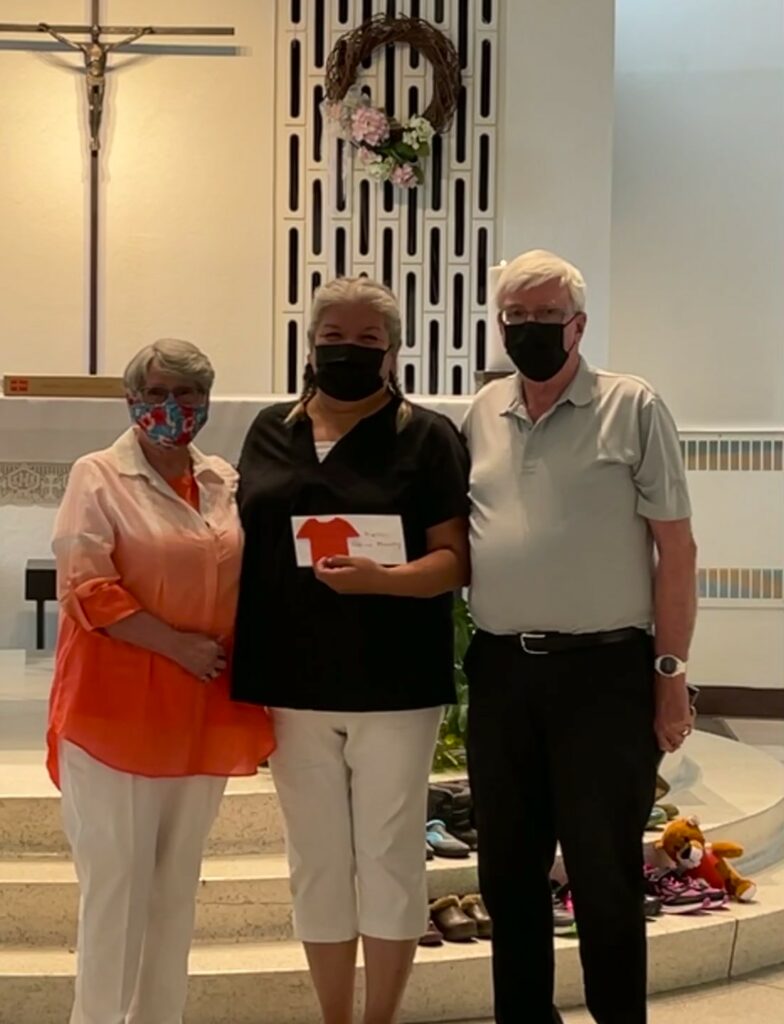
On behalf of the Kateri Native Ministry of Ottawa we would like to extend our gratitude to the Columbus Club-Council 485 of St. Basil’s parish for their generous donation to the ministry.
The parishioners of St. Basil’s have always supported the ministry and we are so very grateful to everyone.
Blessings to everyone.
Donna Naughton
Executive Director
Kateri Native Ministry of Ottawa
